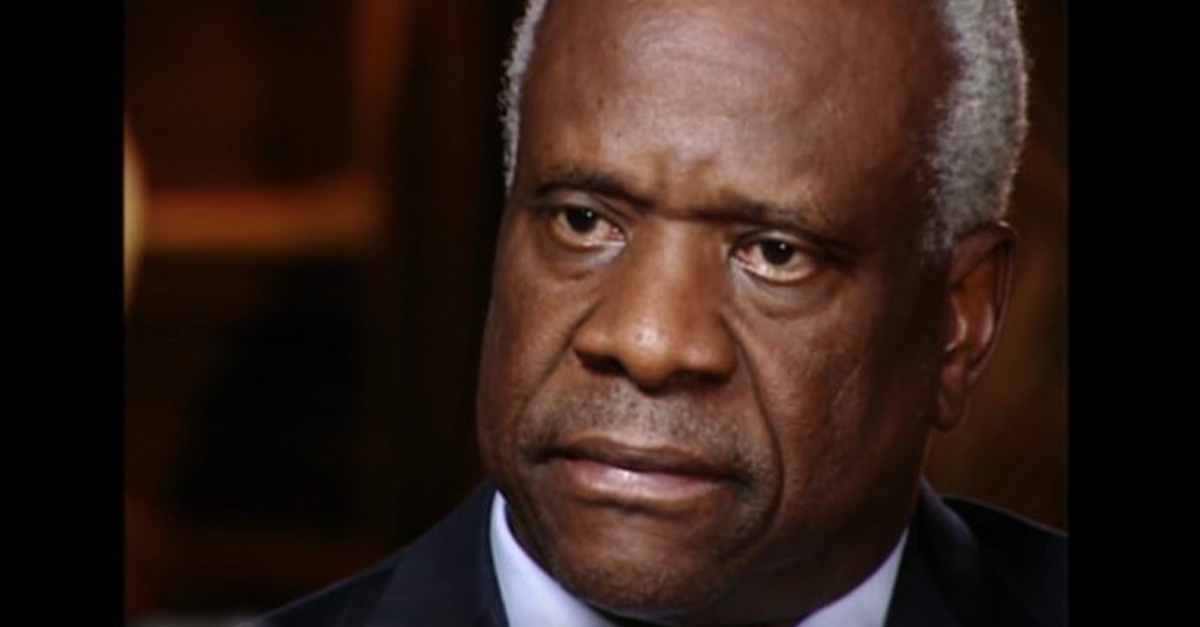


Get a free copy of Parental Rights & Education when you subscribe to our newsletter!

Supreme Court Justice Clarence Thomas indicated this week that he would like for the Court to examine Section 230 protections that give Big Tech companies liability immunity, not long after Sen. Amy Klobuchar, D-Minn., introduced the “Nudge Act,” which would encourage social media companies to censor misinformation.
Thomas made his desire clear in the Supreme Court’s denial of certiorari in Jane Doe v. Facebook. Thomas wrote that the courts have interpreted the hotly debated legal protection “to confer sweeping immunity on some of the largest companies in the world.” He added,
“Here, the Texas Supreme Court afforded publisher immunity even though Facebook allegedly ‘knows its system facilitates human traffickers in identifying and cultivating victims,’ but has nonetheless ‘failed to take any reasonable steps to mitigate the use of Facebook by human traffickers’ because doing so would cost the company users—and the advertising revenue those users generate.”
He continued, “It is hard to see why the protection §230(c)(1) grants publishers against being held strictly liable for third parties’ content should protect Facebook from liability for its own ‘acts and omissions.’”
He added, “Assuming Congress does not step in to clarify §230’s scope, we should do so in an appropriate case.”
This isn’t the first time the justice has taken aim at Section 230. In 2021 he wrote, “We will soon have no choice but to address how our legal doctrines apply to highly concentrated, privately owned information infrastructure such as digital platforms.”
At the same time, however, Sen. Klobuchar is calling for government involvement with social media by introducing the Nudging Users to Drive Good Experiences on Social Media (Social Media NUDGE) Act. The act calls for studies into social media addiction and the spread of harmful content.
While the law’s name may sound harmless, the legislation is a Trojan Horse for government censorship, according to Jonathan Turley, professor of public interest law at George Washington University and a free speech champion. The proposed law, he says, “is less of a nudge and more of a shove toward approved content and choices.”
Turley noted that senators like Richard Blumenthal, D-Conn., have already threatened social media companies regarding censorship, saying that Congress would not tolerate any “backsliding or retrenching” by “failing to take action against dangerous disinformation,” and pushed for “robust content modification.”
Klobuchar introduced the bill with Sen. Cynthia Lummis, R-Wyo., who said, “We can build a healthier Internet without the federal government dictating what people can and can’t say.”
Yet Klobuchar and supporters of the bill seem to reveal otherwise. “For too long, tech companies have said ‘Trust us, we’ve got this.’ But we know that social media platforms have repeatedly put profits over people, with algorithms pushing dangerous content that hooks users and spreads misinformation,” Klobuchar stated.
Public Knowledge, an advocacy group that seeks to influence policy, supports the legislation, saying,
“…it encourages informed decision-making to address a known problem: the promotion of misinformation. The bill empowers the National Science Foundation to study tools to reduce the spread of misinformation as well as the FTC to engage the public in developing rules to provide a healthier internet, giving the public a voice in the process.”
This legislation makes it seem as though the government is simply studying problems and making recommendations. However, those recommendations aren’t suggestions, they’re orders. The Nudge Act would require social media platforms “to implement recommendations and publicly disclose information about their compliance, the impact of the interventions, and other statistics related to required changes and content on their platforms,” and “hold social media platforms accountable by treating violations as unfair or deceptive acts or practices. Enforcement will be handled by the FTC.”
One of the key areas where the idea of misinformation is most mentioned is in regard to COVID. The head of the World Health Organization (WHO), Tedros Adhanom Ghebreyesus, voiced support for musician Neil Young’s boycott of Spotify due to Joe Rogan’s interviews about COVID, saying, “@NeilYoungNYA, thanks for standing up against misinformation and inaccuracies around #COVID19 vaccination. Public and private sector, in particular #socialmedia platforms, media, individuals — we all have a role to play to end this pandemic and infodemic.”
The Surgeon General of the United States, Vivek Murthy, has strenuously advocated for censorship. Last year he called misinformation an “urgent threat” and demanded that social media platforms minimize it. Now he is requesting tech platforms turn over data pertaining to misinformation on their platforms, including demographic information on users who viewed misinformation, the sources of the information, and “exactly how many users saw or may have been exposed to instances of Covid-19 misinformation.”

Misinformation means content that the government disagrees with or that goes against their agenda. At best, it means information that goes against accepted “consensus.” But as we’ve seen repeatedly, much of what has been deemed “misinformation” later turned out to be true.
Censorship is an attempt to control information. If those in power can control the information people can see, they can control dissent and then more easily control the people.
The Nudge Act is a poorly disguised attempt at government control of speech through social media, which thus far has been happy to oblige. Some bureaucrats aren’t satisfied, however, because all dissent hasn’t been brought to heel. This is the government controlling people through private companies, which is a tactic of fascism.
Social media companies should be held accountable for putting users at risk and social media harms should be studied, but not for misinformation. Social media companies are already attacking so-called misinformation, censoring and purging anyone who disagrees with the current approved orthodoxy. What they aren’t doing is putting a stop to real dangers, like shutting down sex traffickers or propaganda pushed by authoritarian regimes like the Taliban or the Iranian mullahs. It’s time that free speech stopped being viewed as a threat because the real threat facing America is Big Government and its proxies.
At a time when the world is recognizing the power of propaganda to control and destroy as seen in the actions of Russian dictator Vladimir Putin, the Chinese Communist Party, and other despots around the world, the U.S. government is increasingly engaging in similar practices — although our leaders say it’s different because it’s all done for the greater good. What’s key here is that the U.S. government isn’t doing this directly. They’re doing an end run around the First Amendment by getting private monopolistic companies to do their censoring for them. And Big Tech has no qualms with doing it because the same government has given them total immunity.
Let’s hope that Thomas’ call for a case that allows the Supreme Court to review Big Tech’s carte blanche ability to shut down any political, medical, or cultural dissent while allowing child sex traffickers and other bad actors to run rampant will be heeded — and as soon as possible.
